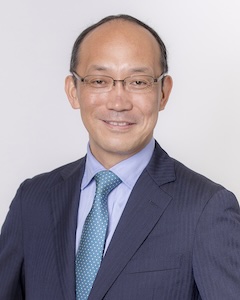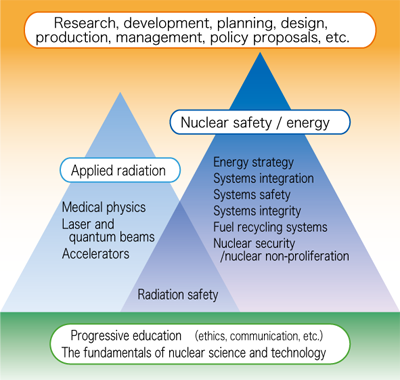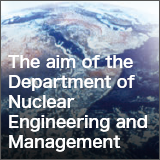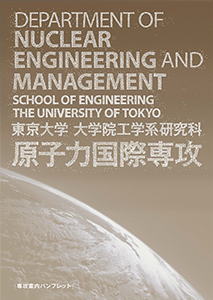- HOME
- Introduction
Message from the Department Chair
Becoming a Key Player in the Global Era
— Study Nuclear Engineering Now
Nuclear engineering is a deeply interdisciplinary field that brings together key areas of modern engineering, including heat and fluid dynamics, materials science, quantum mechanics, and instrumentation. Through this broad foundation, students gain not only specialized expertise in nuclear technologies, but also versatile analytical and technical skills applicable across the entire spectrum of engineering disciplines. As a result, graduates of our department thrive in a wide variety of careers—not only within nuclear energy and research, but also in consulting, IT, finance, trading, and government sectors, where their systems-level thinking and problem-solving abilities are highly valued.
The global energy landscape is undergoing a profound transformation in the pursuit of a decarbonized future. One of the clearest indicators of this shift is the rapid expansion of AI-powered data centers, whose immense electricity demands have renewed global interest in nuclear power as a reliable and low-carbon energy source. At the same time, next-generation reactor technologies such as Small Modular Reactors are advancing quickly around the world, driving both technological innovation and international collaboration. Japan is also at the forefront of a unique global challenge: the removal of fuel debris from the Fukushima Daiichi Nuclear Power Plant, a complex undertaking carried out in close partnership with international stakeholders. In this evolving context, students studying nuclear engineering are uniquely positioned to contribute to and shape the next era of global energy development.
Our department is committed to cultivating highly skilled professionals who can thrive internationally. We offer lectures in English, overseas internships, and international workshops where students engage in in-depth discussions with researchers and peers from around the world. Nuclear technology represents a collective endeavor of global knowledge and technical expertise, and learning at the forefront of this field through our department will undoubtedly empower you for the future.
We warmly welcome all students who are ready to take on challenges and boldly carve out their own paths.
Department Chair
Department of Nuclear Engineering and Management
Mikio Sakai

The aim of the Department of Nuclear Engineering and Management
Building a sustainable society
The previous century was an age of the pursuit of material affluence based on science and technology, but now in the 21st century, mankind is seeking to establish a sustainable society in harmony with the global environment. This is a complex problem containing a web of many elements, i.e., the balance between economic activities that support an affluent lifestyle and the handling of environmental issues such as global warming. With the globalization of international society, the situations in other countries and their policies could influence the economic activities and environmental policies of Japan. We must weave our way through this complex web and continue to cooperate in searching for the path to development. We are involved in education and research on nuclear energy and radiation as well as its utilization technologies, which offer a realistic solution based on scientific and technological knowledge. Especially in recent years, this country is demanding that we produce leaders who can handle international cooperation, including plant export. To this end, in addition to its technological disciplines such as work on nuclear energy and radiation, the Department is involved in international cooperation for education and research with added humanities and social science aspects, including sending its members to international organizations and prominent foreign universities.
Learning from the Fukushima nuclear accident
We have reviewed the education and research policies of this Department in light of the important opportunities presented by the accident at the Tokyo Electric Power Company's Fukushima No. 1 nuclear power plant (the Fukushima nuclear accident) triggered by the Great East Japan Earthquake on March 11, 2011. The background to and root causes of the Fukushima accident are set out below; we must learn from them for the future.
(1) The importance of integrating technology and society
Japan has always put great effort into designing to prevent accidents, but preparations for the post-accident phase were insufficient. Serious consideration should have gone into how to handle the situation when an unexpected risk is exposed.
One of the reason why measures that were, in hindsight, obviously necessary were not taken is the emergence of a social issue that transcends the boundaries of technology; in recent years, the gap between the level of safety that the general public expects and the engineer's expectations of safety has been widening. The ability to integrate technology and society becomes more and more important: we must become aware that the environment surrounding nuclear power is complex, vast and changing. It is becoming ever more necessary to understand the people, society and cultural backgrounds of Japan and the other countries of the world, and for societies to achieve a level of literacy based on progressive education (ethics, risks, communication, etc.).
(2) Balance between conceptual skills and a panoramic perspective
While meticulous verification was carried out on the loading and a wide scope of possible scenarios was envisioned when the plant was designed, the scope of this envisioning was insufficient with regard to important checkpoints for system safety in the event of a tsunami causing a total loss of power. There was excessive focus on detail while significant system defects were overlooked.
The environment surrounding nuclear power has become complex and vast, and both conceptual skills based on fundamental knowledge that has been acquired systematically and a panoramic perspective that transcends borders between fields and organizations and that can grasp the overall picture are necessary.
Building a resilient society and international cooperation
The Fukushima nuclear accident gives us an opportunity to completely review our cultural limitations. In line with this, we are formulating a research plan so that we may learn from these lessons, minimize damage and recover quickly should an accident occur, and establish a stronger system with higher safety levels than before the accident. We believe that such research will contribute to improving nuclear safety all over the world, and will help to make other equally complex and vast industrial fields more robust.
Human resources this Department aims to foster
To meet the above needs, this Department aims to foster human resources with the following qualities.
1. Human resources who have a good understanding of people and society
In addition to the fundamentals of nuclear science and technology, a basic education on people and society that comprises social literacy including risk communication and ethics based on an understanding of knowledge, attitudes, internal and external cultures, points of view, common sense, etc.
2. Human resources who have built upon a progressive education to acquire knowledge and a systematic way of thinking about nuclear safety, energy, and the basics of radiation science and their applications
Systematic lectures comprising core programs, specialized basic courses and advanced courses will be provided to efficiently teach the basic knowledge (basic nuclear science and technology) that students majoring in nuclear energy need in order to form a complete picture of a problem.
3. Human resources who can handle research, development, planning, design, production, management, policy proposals, etc. in an academic setting and how to make use of academics in various fields in a responsible manner with an international perspective
Interdisciplinary project-based exercises develop conceptual skills, a panoramic perspective and leadership through experience in specialist fields in various laboratories and through undertaking cutting-edge research topics.
4. Human resources who can contribute to the sustainability and development of society by becoming pioneers in unexploited fields and boldly pursue research that can lead to new technological innovation
These human resources will be able to contribute to the sustainability and development of society by becoming pioneers in unexploited fields and boldly pursue research that may lead to new technological innovation through project-based exercises (PBL) made possible by collaboration between domestic and international organizations, and research at master,s thesis and doctoral thesis levels.

Guidance book
Department of Nuclear Engineering and Management Guidance Book
Contact
Department of Nuclear Engineering and Management
School of Engineering, the University of Tokyo
Tel. +81-3-5841-2900
7-3-1 Hongo, Bunkyo-ku, Tokyo 113-8656
Email: nem@n.t.u-tokyo.ac.jp
Facebook: http://www.facebook.com/Todai.Eng.Nem






